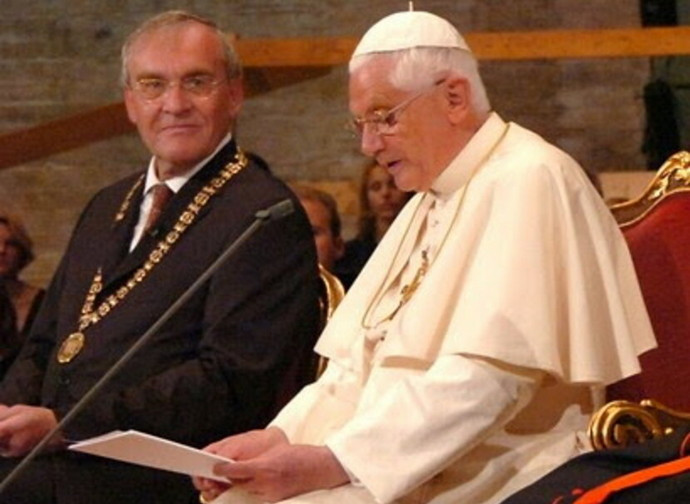Broaden reason: Benedict XVI’s legacy betrayed
Ratzinger repeatedly invited to ‘broaden’ reason, which victim of a secular process that from the 14th century to the present day, via Kant, has made it lose faith in its ability to know the objective and finalistic order of things. This invitation has not been taken up during the current pontificate: the path indicated by Francis is in fact post-metaphysical, i.e. Kantian.

One of the main directives that Benedict XVI bequeathed to us was his invitation to “broaden” Reason. He wrote and said this on many occasions, although we especially remember his speech on 12 September 2006 in the Aula Magna of the University of Regensburg. Reason, he said, had undergone a “self-limitation” that it had self-decreed on its own. This was the result of a centuries-long process that Benedict traced back as far as the 14th century. In Regensburg, he also cited the German philosopher Immanuel Kant as being central to one of that self-limitation’s decisive stages.
Progressively, Benedict insisted, Reason had lost faith in its own ability to know an objective and final order of things, and had even espoused the claim that reality was self-constructed, thus reducing it to being nothing other than expression of a subjective desire. Such a weakened form of “Reason” is no longer able to open itself up to the Christian---or rather Catholic---Faith. This is because the latter makes demands upon what constitutes reasonableness that this weakened form of Reason can no longer satisfy; demands that it indeed decisively rejects, as doing violence to and imposing itself upon it.
A weakened and debased modern Reason can get along well with religions that have no claim to Truth and accept being regarded as subjective myths in the public square. But this cannot be the case for the Catholic Religion. Considering itself to be the Religio vera and not a myth, Catholicism raises the question of Truth, and on this basis it also questions Reason, thereby inviting it fulfill its complete potential. Benedict XVI's “Broadening of Reason” was achieved by means of the Faith taking the “high road of evangelization” in dialogue with Reason---doing so by basing itself on the common ground of the hunt for Truth.
We must acknowledge that in the decade of Francis' pontificate Benedict’s legacy has not been nurtured. Francis' Church wants to be post-metaphysical---hence, Kantian---and does not believe at all that- as Benedict claimed - the encounter between Greek Philosophy and the Christian Religion was providential. Francis' philosophical approach is existentialist and historicist. He no longer uses the term “nature” and avoids the adjective “natural” that refers to structures that are not subject to change. We can say that it is also nominalist, in the sense that, for Francis, life is made up of individual, unique experiences, and thought cannot grasp universal structures in reality. For him, therefore, one cannot provide categories of thought that reflect the real, final structure of things. Nor can one offer forms that define the intrinsic evil of an action, and for this reason it is not even possible to judge an action, as he has expressly stated. For instance, for him, there is no category of “remarried divorcees”, and no moral form of adultery, but simply the individual, unique, and unrepeatable experiences of this or that remarried, divorced couple. One cannot therefore make an evaluative judgment of a structural situation, of a public sin, of an objective impropriety. Rather, one must encounter that experience only from within its own specificity.
Francis' invitation not to judge reflects the replacement of a metaphysical and cognitive paradigm of universal structures with an existential and experiential one---circumscribed each time by a specific situation. In this way, however, Reason is restricted. The Exhortation Amoris laetitia (2016) was an important step also in this respect. The new approach demobilized all truths considered objective regarding divorce, adultery, sin, and the approach to the sacraments, and in their place was put the subjective and dialoguing conscience that moves within unique existential situations that can only be interpreted through an infinite path of discernment. In this way, all Catholic moral theology is called into question. St John Paul II's Veritatis splendor, to give an example of something quite different, did not contrast norm and situation, law and conscience, as the new Magisterium now does.
We are faced at this point with a limitation of Reason. If all reasoning is placed within a specific situation, and it is not possible for Reason to know objective and universal structures, then it will only be possible to experience, to encounter the other, but not to truly know it. It will also become impossible to know when one is in a state of sin.
On 29 January 2018, Francis published the Apostolic Constitution Veritatis gaudium on studies in universities and ecclesiastical faculties, replacing the Constitution Sapientia christiana of St John Paul II. In the new constitution, the word metaphysics is not even included. There is no reference to realism as a method of philosophy. Great emphasis is placed on interdisciplinary dialogue, but without any order except the (very weak) one guaranteed by anthropology. There is no echo of the strong statements made in Fides et ratio (1998). There is no doubt that this is a weakening of Reason.
Considering this narrowing of Reason, one can understand how everything dissolves into a vague theoretical attitude of acceptance. The Church of Synodality entails an “all in” and an “everything in”. It postulates the blurring of the distinction between the teaching Church and the learning Church. It admits the promotion of the most varied logical and theological oddities without anyone specifying anything.


